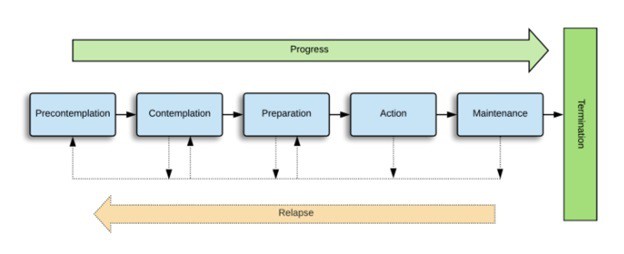Judgment and the Stages of Change
25 August 2021
Two ideas have recently come together: the futility of judging addictive behaviours and the dissolving of the desire to judge when faced with the Cycle of Change, (CoC, Prochaska, DiClemente, and Norcross, 1992). Regular readers will recall that the CoC is included in SMART Recovery as a means of gauging one’s readiness to approach an addiction-free life.
The stages in the CoC are illustrated below:

Figure 1: The 6 Stages of Change, Sutton, J. (2020)
This model of change has been around since 1977 and has generated its share of commentary. In the context of addiction versus recovery, I will add two end states and re-title the chart in Fig. 1.1 as The Five+ Stages of Change, illustrated below. The point of the two additions is to clarify, on a grand scale, what’s at stake as one moves toward a lapse or sustained recovery.

Figure 1.1: The Five+ Stages of Change, Sutton, J. (2020), with additions.
But there is another interpretation of chaos and order in the context of change. A couple of decades after the CoC was introduced, a Canadian ecologist, C.S. Holling, outlined the Adaptive Cycle, another way of looking at change cycles. Without a full-blown explanation, what interests me about Holling’s thinking is his inclusion of entropy (chaos) as a necessary component of change.
The example he uses is a forest in which optimum conditions have allowed trees to grow too closely together. As the forest matures a dry summer (like this one in Western North America) occurs, and fire spreads quickly, destroying the trees. In general terms, fire is an agent of chaos destroying the forest but, in subsequent years, fostering ideal growth conditions...thus bringing about the conditions to begin the adaptive cycle anew.
In terms of addiction, the parallel to fire is hitting rock bottom (chaos). At that point, there are two options: death or a quantum leap to a new cycle. If the new cycle is embraced, entropy has served as a regenerative force. Anything that stands in the way of that quantum leap, is messing with a movement toward order. As such enabling the addictive behaviour becomes a disruptive (entropic) intervention.
If we picture a man at the end of his addictive rope, no money, no work, no caring family left, at a point where he awakens to a fuller and more accurate picture of his present predicament, anything that softens the data he’s processing actually takes him back to escaping pain through addictive behaviour. Softening his view moves him backward and away from his precontemplative or contemplative stage within the CoC (Cf. Figs. 1, 1.1, above).
Maté (2018) quotes Eckhart Tolle (2004) stating “One of the main tasks of the mind is to fight or remove the emotional pain, which is one of the reasons for its incessant activity, but all it can ever achieve is to cover it up temporarily. In fact, the harder the mind struggles to get rid of the pain, the greater the pain.” So, what do you do? Stop struggling and start accepting. Accepting is facing. Facing the pain is entering contemplation or even preparation within the CoC, which is movement in the direction of order. Failing to face the pain is movement in the direction of chaos.
If I judge that person for not facing his pain, I am adding to his burden (and mine). I’m helping neither him nor me and arguably moving us both further in the direction of chaos, as we will seek to remove the pain through unhealthy coping behaviours = addiction or distractions. Whereas, if I accept another’s addictive behaviour as simply a manifestation of where he’s at in his journey, he doesn’t feel my censure, arrogance, or rejection and nor do I.
At the core of every addiction is an emptiness based in abject fear. The addict dreads and abhors the present moment; she bends feverishly towards the next time, the moment when her brain, infused with her drug of choice, will briefly experience itself as liberated from the burden of the past and the fear of the future—the two elements that make the present intolerable (Maté, 2018, p. 259).
The ability to face one’s past and future squarely comes with total and abject acceptance of the truth. Judgment of people struggling along this path is, at best, irrelevant and, at worst, counter productive = fostering more chaos.
Dan Chalykoff is working toward an M.Ed. in Counselling Psychology and accreditation in Professional Addiction Studies. He writes these blogs to increase (and share) his own evolving understandings of ideas. Since 2017, he has facilitated two voluntary weekly group meetings of SMART Recovery.
Dan, your last three blogs have been incredible reads. Although some facts/truths are harder to read about than others (i.e., your Withdrawal post, earlier this month), your insights and messages ring so true. The judgement vs acceptance motif of this blog also adds another layer of contemplation when I think about the CoC. I am still rereading and reprocessing Mate’s quote from p. 259…SO powerful! Thanks for continuing to make me think, Dan!
You’re entirely welcome, Trish! Thanks for reading, reflecting, and commenting–always appreciated.